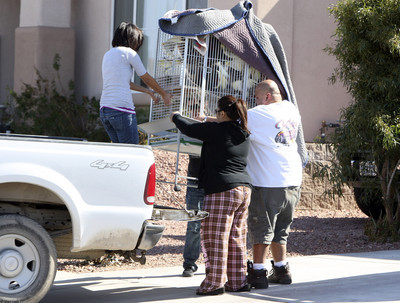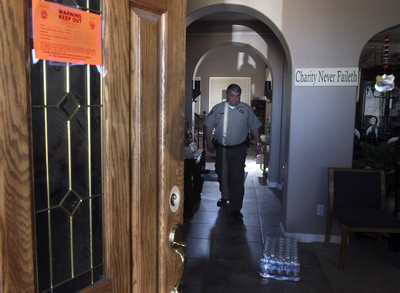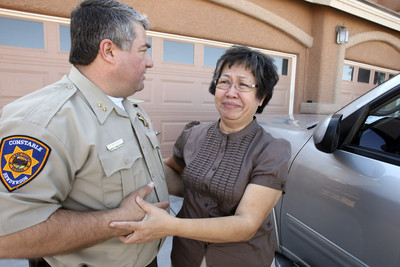Henderson officer sees families grieve over evictions
Henderson Constable Earl Mitchell pounds on the front door of a foreclosed home that three years ago sold for more than a half million dollars.
The repeated pounding and the reflexive howls and barks of dogs on Warsaw Avenue echo throughout the upscale neighborhood.
It's about 11 a.m. as the 53-year-old Mitchell crouches in the shade of the front porch overhang to peer inside the picture window. He sees no movement, although he can hear puppies whimpering inside.
But then Mitchell's deputy director, Steve Kilgore, runs toward him, motioning that he's seen something move in an upstairs window, a gesture that immediately causes Mitchell to draw his gun.
Mitchell prides himself on never having had to get physical or discharge his weapon in a foreclosure eviction. But these are the dark days after the Las Vegas Valley's housing boom, and anything can happen.
BEARER OF BAD NEWS
In their Henderson office an hour before going out on the eviction, Mitchell, Kilgore and Deputy Constable Dan McKeaney said they never know how people are going to react when faced with losing their home.
"It can get highly emotional," Kilgore said. "I could see one of these situations blowing up and many people getting hurt."
The challenge of losing a home, the strain of ruined credit and the shame of having failed at the American dream can be a combination so combustible that the bearers of bad news catch the brunt of the frustration and anger, Mitchell said.
"Often we have to let them vent," he said. "I try to treat these people with as much dignity as I can. When people see I respect them and have compassion for their situation, they don't act out. They're just verbal."
It's not always that way. Bullets have been fired through doors during evictions.
And 10 years ago, one of Mitchell's deputies who went out on an eviction heard a shotgun blast when he knocked on the door. When authorities entered the home, they found a body and a suicide note. The man had lost his job, lost his wife, and was about to lose his home.
"Losing a place to live was the final straw," Mitchell said.
One of the locksmiths he sometimes uses, Joe Ingersoll, often talks about how he was shot in the hand seven years ago when changing locks during an eviction for another constable.
"People really get upset," Ingersoll said. "I've been hit in the back with a board, had people try to knife me and had vicious dogs sicced on me."
Nevada holds the top spot in foreclosure filings. One in 76 Nevada homes faced foreclosure in January. California was a distant second with one in every 173 homes.
'THEY WEREN'T HONEST'
When Mitchell arrives at the home on Warsaw Avenue on Feb. 19, he hopes no one will be home. He says the Leopoldo A. Adaoag family had been told by his office that the foreclosure eviction would occur that week. Tacked to the door of the home was a notice to lawmen that the family was seeking legal action against eviction.
"They definitely don't want us coming in," Mitchell tells his colleagues.
But the notice, signed only by Adaoag, has no legal authority.
"I like it best when the people move out and I can just go in and get the locks changed," he says. "I don't want any confrontation."
But it appeared a confrontation might be what he was in for this morning. After Kilgore sees the movement upstairs, Mitchell hears a loud voice and crying. He raises his handgun toward the door.
Then the door opens.
Jamie Adaoag, the daughter-in-law of Leopoldo and Rosie Adaoag, stands in the doorway holding her 5-month-old baby as her 3-year-old son cries at her feet.
Mitchell quickly slips his gun in the holster while Kilgore and McKeaney check out the rest of the house.
"It's all clear," McKeaney yells.
On the walls of the house downstairs are family pictures. Birthday decorations adorn the plush-carpeted living room that is filled with furniture that looks new.
Several small dogs in a cage near the kitchen bark. Cockatoos in the garage squeal.
The young mother, cell phone in hand, nods as Mitchell informs her he is there for an eviction. Trembling and fighting back tears, she calls several members of her family, including her husband and mother-in-law. Mitchell worries aloud to Kilgore that with so many people showing up, the situation could get out of control if anyone "was really upset."
But when Jamie's husband, Darryl, shows up, he says little, gathering clothes for his children. When Jamie's sister-in-law, Shanalei Adaoag, drives up, she is worried about the family's dogs and birds.
When Rosie Adaoag, the family matriarch, arrives in her car, she is hyperventilating.
"I had heart surgery not too long ago," the native of the Philippines says in heavily accented English. "I can handle this. I'm sure I can."
As the constable quietly explains that she quickly had to gather medications, pets, and whatever other clothes and documents she might need, Rosie Adaoag does something that Mitchell never saw coming.
She hugs him.
"I know it's not your fault," she says, tears streaming down her face.
She says she and her husband had a case in District Court that she hoped would stop the eviction. She says her daughter and son and daughter-in-law and two grandchildren, all of whom were living in the home, have "nowhere to go."
"Maybe the judge will rule our way today," she says.
Standing in the driveway of her home, she spoke of "predatory lenders."
She says in 2006 she and her husband put a total of $50,000 down -- their life savings -- on a house they purchased for a little more than $500,000. About 3,400 square feet, it has five bedrooms and three bathrooms.
"They approved us for the loan, but my husband only made $39,000 a year as a supervisor at Pulte Homes," she says. "They told us we would have a $4,500-a-month house payment, and we said we couldn't afford that. But the loan processor said to sign, that we could refinance in six months to a much lower payment ... that the interest rate of 10.75 percent would go down."
However, a chance at refinancing did not come for several months, Rosie Adaoag says, and the payment only lowered to $3,800 a month.
"We took money from my husband's 401(k) and borrowed from many people," she says. "But we finally couldn't make any more payments last year. That's why we got foreclosed on."
Rosie Adaoag says she and her husband repeatedly stressed their concern to the mortgage lender that they couldn't afford the house before they bought it, but were told that, through creative financing, "it would all work out."
"They weren't honest with us. We shouldn't have trusted them."
SUBPRIME LENDER
The Adaoag's initial lender, Argent Mortgage, once was the nation's largest subprime lender and a large player in subprime lending in Southern Nevada.
Though subprime lending began as a way for borrowers with poor credit to get loans, but at higher interest rates and with extra fees, critics of the process say it later turned into a lucrative business targeting customers who didn't know they might be eligible to qualify for traditional fixed mortgages.
Last year, the Ohio Civil Rights Commission ruled there was evidence that Argent discriminated against black homeowners and home buyers in the Cleveland area by targeting them with predatory, subprime loans they could not afford. Though not admitting guilt, the company paid a $35,000 fine.
Orson Benn, once a vice president at Argent, was convicted of racketeering in Florida last year. He is now serving an 18-year sentence. Authorities said he spent three years during the height of the housing boom tutoring Florida mortgage brokers in the art of fraud.
Unknown is whether the Southern Nevada Mortgage Fraud Task Force, formed by the FBI in the wake of the area's foreclosure quagmire, is investigating Argent's work in Las Vegas. Attempts to get a task force comment were unsuccessful.
Representatives of Citigroup, which purchased Argent in 2007, refused to discuss Argent's mortgage lending practices.
HUSBAND DEPRESSED
In the weeks since the Adaoag family was evicted, the family's self-filed lawsuit asking that the eviction be stopped because of unfair lending practices was denied.
"I'm sure another lawsuit will be successful," Rosie Adaoag said in a recent interview. "We have to get our money back. We just have to."
Adaoag said her husband is "very depressed. He can't sleep at night. He can't believe we have lost all that money. I must tell you I am very, very worried about him."
The family is now living with friends after briefly staying at a motel.
The Adaoags have yet to move their possessions out of the foreclosed house. Under Nevada law, Mitchell said the family has 45 days from the date of the Feb. 19 eviction to pick up belongings. After that, the new owner of the house has the right to deal with the property as he sees fit.
"We really don't need to move our stuff," Rosie Adaoag said. "When we get a lawyer to file another suit, a judge will rule in our favor. We'll be able to move back in, and then my heart won't hurt so much."
Contact reporter Paul Harasim at pharasim@reviewjournal.com or 702-387-2908.
Henderson Cnstable Earl Mitchell draws his gun.
o
AUDIO SLIDESHOW

























